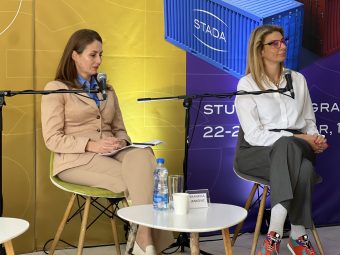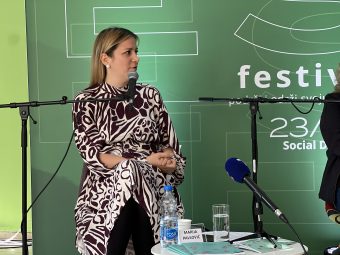Equality, inclusion and gender equality are still topics that require an open conversation. The extent to which women in Serbia are discriminated against, especially when it comes to the labor market, was discussed at the panel on gender equality within the ESG festival, organized by the Hemofarm company and the University of Belgrade. This event brought together five outstanding women, who, thanks to their work and dedication, are in successful business positions. Their experiences and insights into the state of society provided valuable information and inspiration to other panelists.
The panelists talked about the importance of finding balance, stressing that it is a very broad concept, different for everyone. Marjana Davidović, general director for the southern part of the Adriatic region of the Nestle company, emphasized that women should accept their role in society and the expectations that come from family, children and partners, because we cannot change the entire environment around us. However, she added that it is important for every woman to find her personal balance and accept, to be okay with that, that things are not and do not always have to be perfect.
Sandra Savić, senior director for corporate affairs and communications of the Hemofarm company, opened the discussion on the presence of women in science, with the sentence presented by Antonio Guterres on the occasion of March 8 – if we continue with these trends, it will take 300 years to reach gender equality. On that occasion, Guterres talked about the innovative and technological part of the world where men have once again taken over the dominance. Marija Pavlović, representative of Bio4Campus from the Ministry of Science, Technology and Innovation, following up on the open topic, presented statistical data that the Ministry and eScience have, which say that about 55 percent of women are in science.
“If we look at the STEM fields, which includes science, technology, engineering and mathematics, and if we look at the institutes within the University of Belgrade that are in those fields, and there are about 11 of them, eight institutes are headed by women,” said Pavlović.
As she added, it is important to recognize all the benefits of gender-equal, balanced teams, compared to teams that are not.
Brankica Janković, Commissioner for the Protection of Equality, confirmed that the shift is present, stating that when it comes to STEM sciences, the interest of women is growing, and the share increased from 21 percent in 2011 to 32 percent in ten years.
As she emphasized, it is important that girls and young women today have someone they can look up to, because there is a presence of women in science and in prominent positions.
Although some progress has been achieved, women still remain the most discriminated against, and that is precisely in the labor market. If we look more precisely, we are talking about women over the age of 45.

According to the official data of the National Employment Service, which was presented by the commissioner for the protection of equality, although the unemployment rate dropped significantly, the age group 45 plus years, and especially women, remained unchanged. She cited insufficient support for women as the reason for this situation. As she explained, women at that age acquired various skills through taking care of the family, children, and its older members, however, they do not have the skills that are in demand in the labor market today. According to her, the National Employment Service should work on preparation programs for entering the labor market.
“The fact that she does not know the business culture that is required does not mean that she cannot master it. It needs to overcome the internal barrier,” concluded Janković.
Marija Mitrović from the Trag Foundation said that women after the age of 50, unless they are very well positioned and have built a career by that age, actually become unemployable even though they are still in the workforce.
The panelists also referred to the category of young women, as well as those from rural areas. Speaking about women from such environments, Mitrović pointed out that they are discouraged from further education and remain at the high school level, which leads to jobs that are less qualified and therefore less paid.
When it comes to young women, the participants agreed that motherhood remains a significant problem. In this sense, discrimination is seen in employers’ assessment of whether women are of reproductive age or not, which affects the decision on their employment. The commissioner for the protection of equality also reminded of cases when women are fired or are transferred to lower positions after returning from maternity leave. The CEO of the Nestle company said that many employers today know what they must not say, such as questions about family planning, however, it takes time for us as a society and individuals to really adopt these inner values.

The panelists agreed that for the simultaneous development of women in the business world and the opportunity to realize themselves as mothers, it is important that the population policy is focused on preschool institutions and the conditions in them. For the decision on motherhood, not only one-time financial support is important, but also the stability of the workplace, but also the society to know that they have support during their career. Speaking on this topic, Davidović gave an example from Switzerland, where kindergartens work from 10 a.m. to 2 p.m. As she explained, a large part of business women, as well as men, cannot bring and take a child from kindergarten at that time. In Serbia, the situation is better in this regard, and this is precisely an example of the support that a woman should have from society.
In order to achieve further progress when it comes to gender equality, Davidović emphasized the importance of raising children and raising a generation that will support his or her partner. Solidarity was the topic that ended the panel. The participants concluded that solidarity comes from within and is something that is learned throughout life, from growing up in the family to the workplace. As they pointed out, women should be encouraged to overcome their insecurities or fears of failure. The commissioner for the protection of equality said that role models are needed, especially male role models, who will not be ashamed to talk about it openly. As Pavlović concluded, true solidarity comes from within. If we compete with others, that is not solidarity. Where everyone competes with themselves, but if they are really fundamentally aware of it, they will do their best, and solidarity will naturally follow as a state of society.
Katarina Vuinac
Source: energetskiportal.rs


